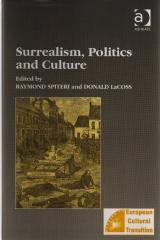Drawing on literary, art historical and historical studies, this essay collection explores the complex encounter between culture and politics within Surrealism. The Surrealist movement was one of the first cultural movements to question explicitly the relation between culture and politics, and its attempt to fuse social and cultural revolution has been a critical factor in shaping our sense of modernity; yet few books have been published that directly address this aspect of the movement. Although the historical importance of Surrealism is beyond doubt, politics plays an ambiguous role in the movement: it indisputably pervades the work, informing its endeavours, yet it seems to evade direct articulation.
This anthology addresses not only the contested ground between culture and politics within surrealism itself, and within the subsequent historical accounts of the movement, but also the broader implications of this encounter on our own sense of modernity. Its goal is to delineate the role of radical politics in shaping the historical trajectory of Surrealism by drawing on the new perspectives provided by the latest considerations of social history, gender studies and postcolonial or race studies--approaches further modulated by the theoretical, methodological and disciplinary focuses of each contributor. This approach reveals new dimensions in the work of central figures like André Breton, Joan Miró, Salvador Dalí and Hans Bellmer, the Surrealists' involvement in the politics of race and anti-colonialism, their relation to communism and anarchism, and the role of exhibitions as a site of political struggle. The volume illuminates how Surrealism played a contentious yet integral role to the development of contemporary French thought, and how it forms the background to current intellectual debates through its contribution to recent French theory.
The volume represents an important contribution to the fields of cultural history, literary studies, art history and cultural theory.

(0 Comentarios)